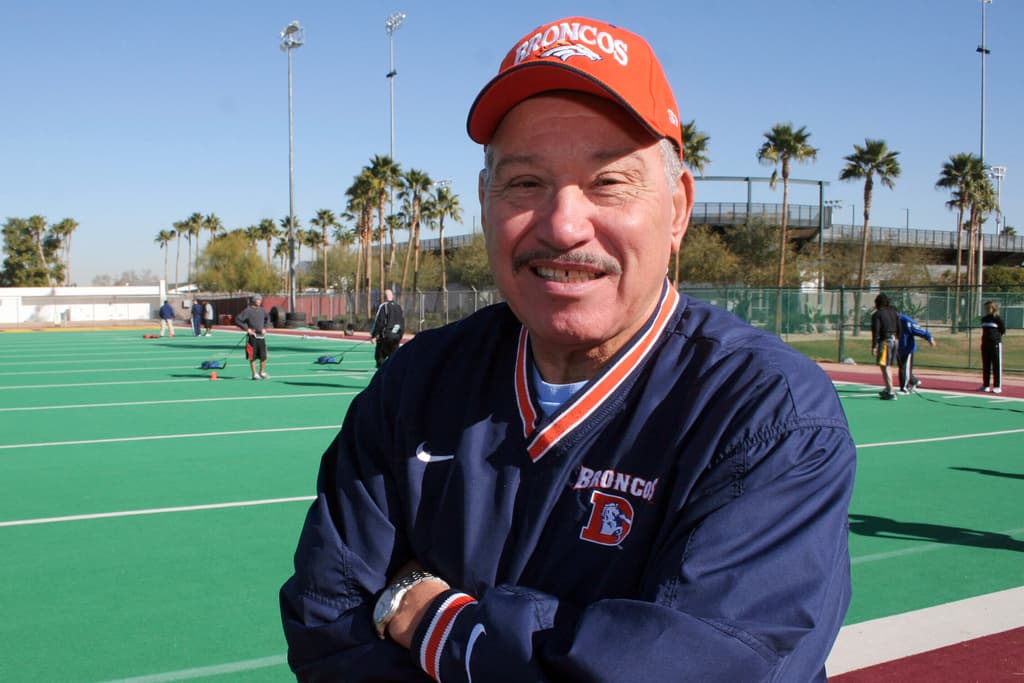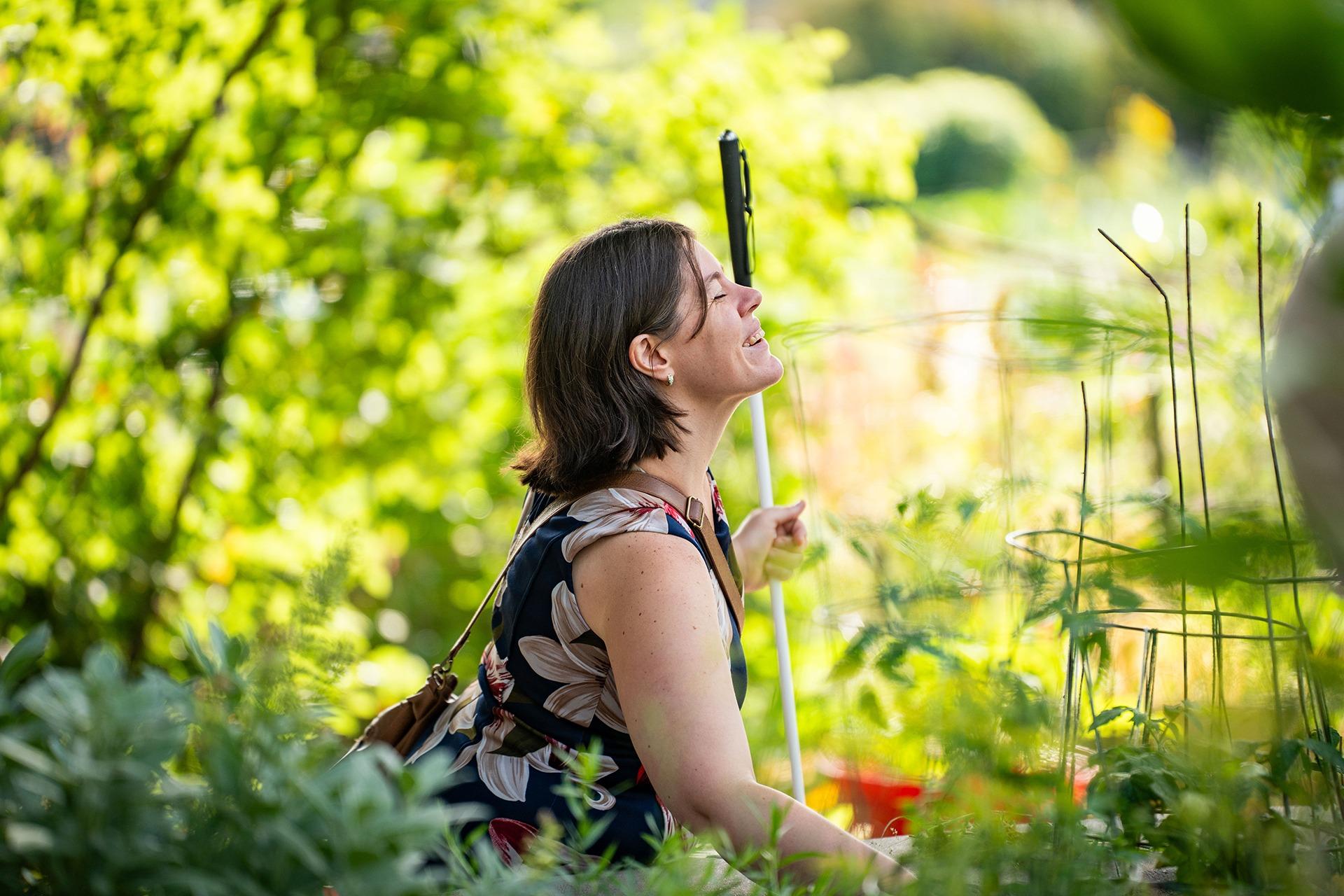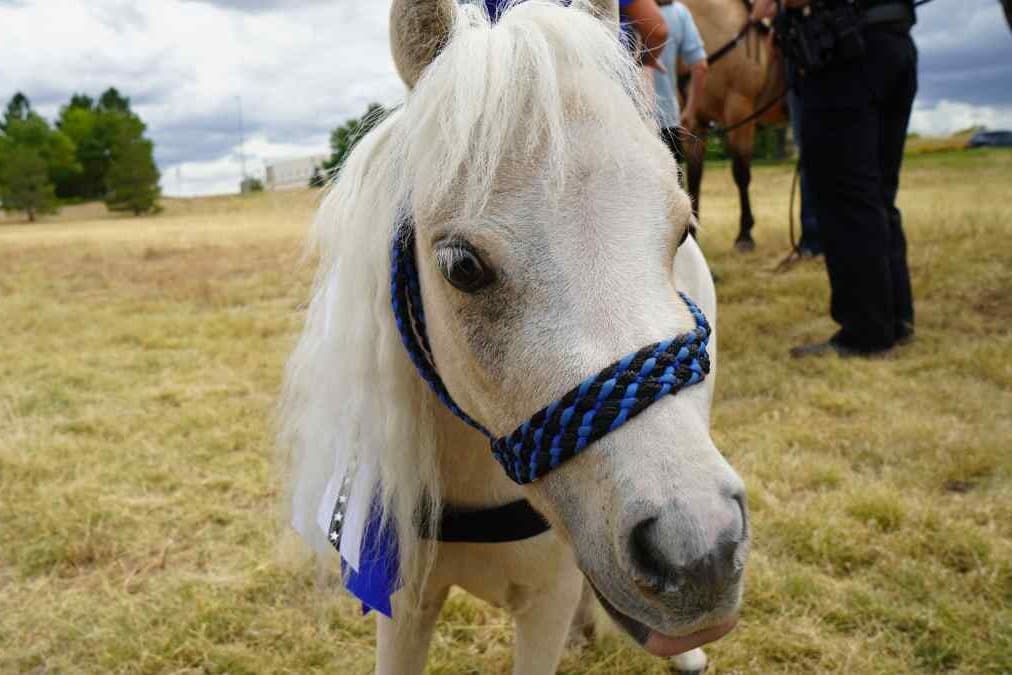
Of the dozens of new apartment buildings going up in Denver these days, one stands out.
The Sanderson Apartments on South Federal Boulevard feature trauma-informed design to accommodate those who experienced abuse and other ordeals when they were homeless. Architectural choices — from the hallways, to the bedrooms — were made to make residents feel at home.
"I was abused as a child, and I left home when I was 13," says Gerry, who lives in the apartments and asked us not to use his last name for privacy reasons related to violence and drug use.
The 60 apartments are for people who've been chronically homeless, and may struggle with addiction or have been in and out of jail.
"You've got everything you need," said Gerry, who's lived here since the building opened in August. "You've got a microwave, you've got a stove. You know, you've got every convenience of home."
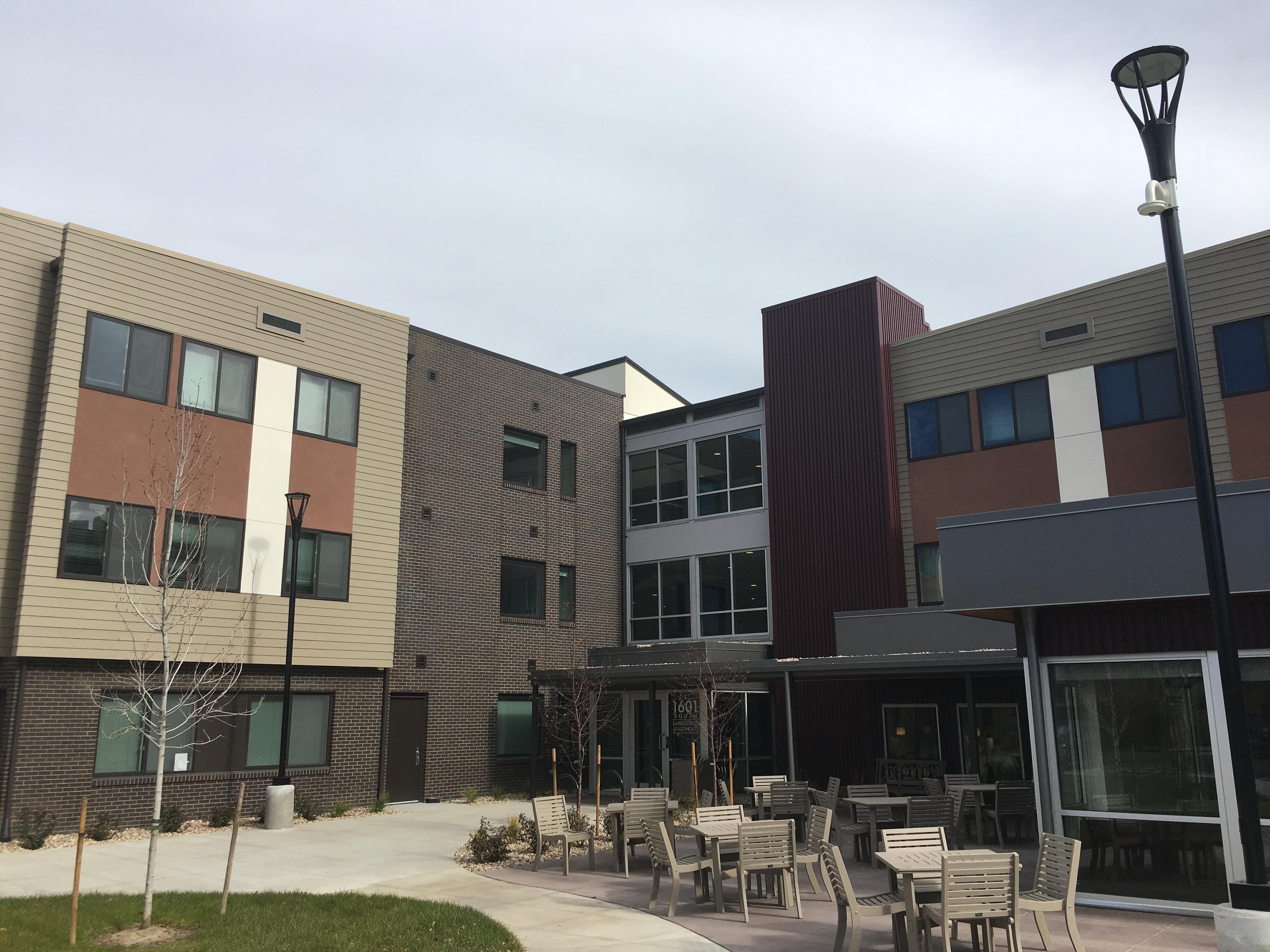
JoAnn Toney, head of residences for the Mental Health Center of Denver, said the architects considered what someone might or might not want in an apartment after they've experienced a trauma.
Sanderson could be one of the first buildings of its kind, she said. On a tour, the first stop was a place outside — an enclosed but airy patio.
"Since we work with people who are chronically homeless, we know that the outdoors is something they're used to, something they're comfortable in," Toney said. "That's where they've lived. And so we intentionally designed this so that they could have that anytime they wanted it."
People need time to get used to living indoors after so many years on the streets, Toney said.
"If they feel more comfortable with a bed roll out here, they can sleep out here," Toney said. "Because they may not feel comfortable sleeping in a unit they don't know is home yet."
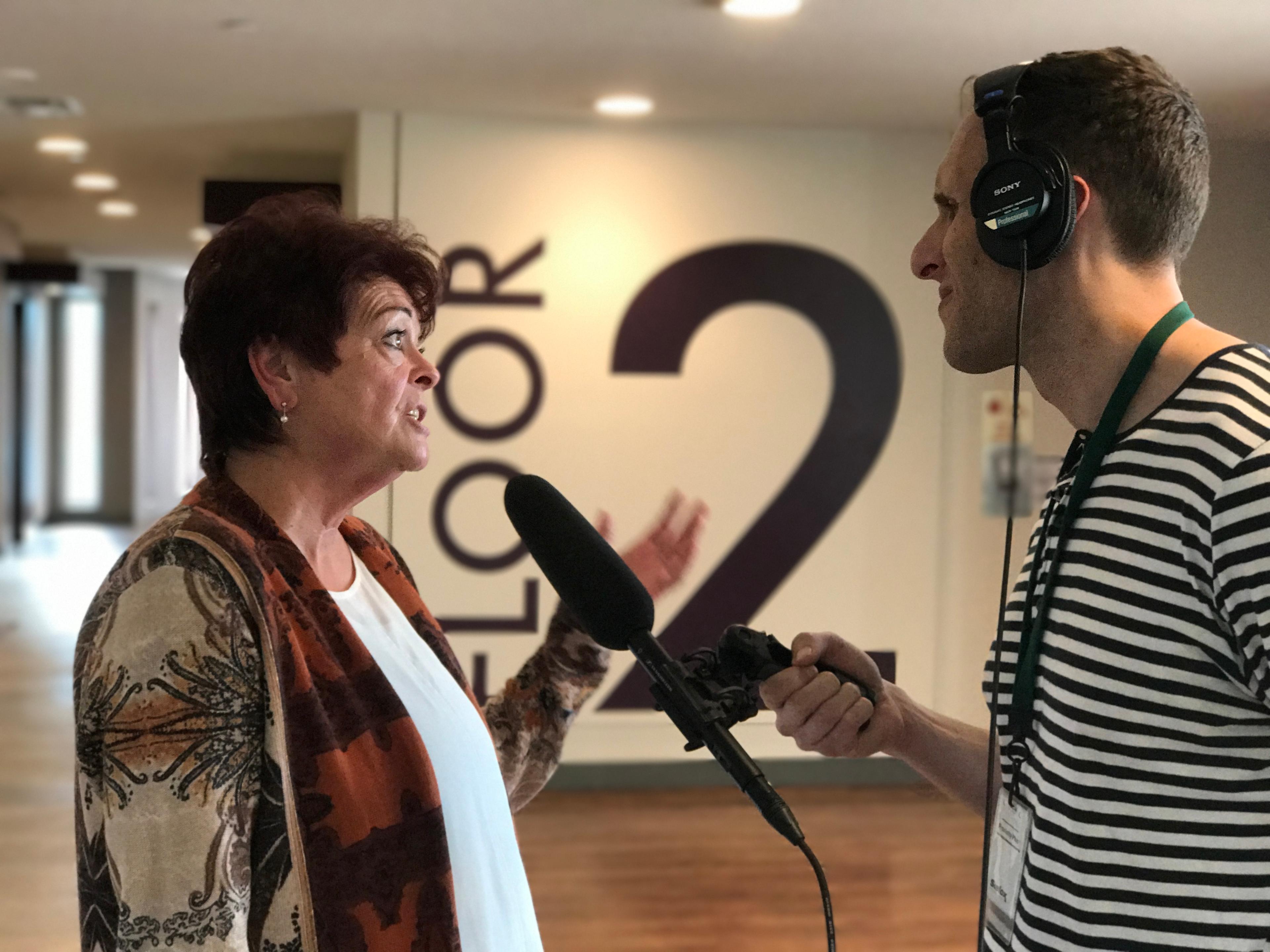
The first floor hallway is unusual, too. Instead of one solid line from end-to-end, each door is stepped in — almost like a staircase. That allows the residents to see who else is around.
"It mitigates their anxiety," Toney said. "They know they're safe; they know they're home."
And if residents feel cooped up in their apartments, there are common areas including a library, a gym and a TV room. When they'd like privacy, their furnished apartment is waiting for them. A big hit is a bucket of cleaning supplies they're given.
"I think they just haven't had something to clean," Toney said. "The prospect of doing that is pretty exciting."
Like the openness of the building itself, the apartments are left open too. There aren't doors on the kitchen cabinets or the closets.
Gerry is settling in to his new home — and thinking about the future. A Harley Davidson blanket is pinned to the wall above his couch. Someday, he hopes, he'll own one.
Transcript of Our Conversation with Gerry
Ryan Warner: You didn't have a roof over your head for decades then? Gerry: No I haven't. I've never had a roof over my head. I've never had my own place. I've always been adapted to the way of street life and doing drugs and alcohol. I was a hardcore addict for a long time. I've got nine months clean off of heroin. RW: Can you just tell me why abuse for you lead to homelessness? G: Well I was physically abused by my parents, and I just didn't feel I belonged. So I left. RW: Have you moved around? G: Arizona is where I'm from. California, New York, Cincinnati. I've been all over the U.S. until I was 13 until I was about 22. Then I came to Colorado. I've been here ever since. RW: So you've been here for decades? G: Yeah I've been here almost 30 years. RW: Where did you spend most nights? G: Just on the street. Just different places to sleep. You find the places that are comfortable, where you can sleep at. But I'd move around from place to place so the law wouldn't mess with me. I never stayed in one spot too long. I'd camp out in one spot for two nights and then I'd move along. RW: Because you were anticipating law enforcement shoeing you away? G: Yeah, telling me that I had to leave. The cops didn't really bother me, they were just doing their job. RW: Do you remember when you first tried heroin? G: Yeah I was 13-years-old. RW: You were addicted to that drug for most of your life. G: Yes. And it ruined my life. RW: How? G: Well, I didn't get an education. I'm intelligent, I do a lot of reading. Always have. But the thing is, I grew up getting my education on the streets. Being street smart, educate myself with books. RW: What does it mean to be street smart? What are the kinds of things you've got to learn? G: Oh survival. When you're on the streets, it's rough. It's not easy. A lot of people don't realize just how hard it is. When you're out there on the streets, a lot of times it's a life or death situation. RW: What are some of the tools you developed to make it? G: You know, respect. For other people. When you're on the streets, just getting along. You look after each other the best you can. You make friends with other people that are homeless. The thing is, you pretty much become a family looking after each other. RW: So you've done some jail time? G: Yeah I've done prison time, jail time. I've been in and out of jail since I was a kid. RW: So in that way there was a roof over your head, but I don't imagine that feels like home. G: No it don't, but this does. RW: Do you think that having a roof over your head has helped your sobriety? G: "Oh yeah, immensely. Because I'm away from it. I'm away from the drugs and alcohol. RW: You're away from the temptation! G: Yeah, exactly. RW: What do you do when you want heroin? G: Well I don't really want it anymore. I don't really think about it. But whenever I have problems, I talk with somebody. RW: "What do you see for the future?" G: I don't really look to the future. I just look day-by-day. I still do. RW: I know that's really important sometimes when you're trying to get sober. One day at a time, right? G: Yeah, oh yeah. It's all you can do is take it one day at a time. Sometimes take it one minute at a time. RW: What do you want for yourself? G: I just want a roof over my head. You know? And I got that. RW: Have you been in shelters at all? G: No I won't stay in shelters. They're disgusting, they're dirty. RW: You found it cleaner to actually stay.... G: To sleep outside. RW: Why? G: Oh people will bring in all of their stuff, they bring in bed bugs and everything else and then you get bit up. And I'm like, no. It's disgusting. RW: How did you survive the coldest nights? I often wonder that in the winter, especially if you're not in a shelter. G: Surviving the cold is easy. It's not that hard. Cardboard is a wonderful thing. Cardboard holds in the heat. Refrigerator boxes are really big and thick. RW: So you'd find a box for refrigerators and that was big enough to sleep in? G: Yeah. Refrigerator boxes, those disposable cup boxes are really big. RW: What about food? How did you stay fed? G: I'd fly a sign. RW: You'd fly a sign? What does that mean? G: It's a sign you hold up that says something on it. RW: So you would beg for food. G: Yeah. Pretty much. Well I didn't really beg for food because my sign said, 'I bet you a buck you read this, haha!' RW: People did, and then they gave you a dollar. G: Yeah. RW: Is that how you afforded drugs too? G: Oh yeah. I'd panhandle. I'd fly a sign. RW: You talked about having developed friendships on the streets. Almost like a family. Are those people you're still connected to? Do you miss aspects of that life? G: I miss some of it. But the thing is, the majority of it I don't miss at all. I've got new friends here too, being here at the Sanderson House. The staff here is wonderful. They're really good people. RW: What do you miss about your previous life? G: Just staying with my friends, you know. Camping out with them, talking at night. You know, stuff like that. RW: Do you miss the outside? G: Kind of. Sometimes I do. Sometimes I stay out all night just to walk around. RW: Even with this apartment? G: Yeah. It's the life I got used to. I still see some of my friends. I camp out with them still once in awhile. RW: What made the best sleeping spots? I think about that too. It's such a vulnerable thing to be asleep outdoors. Where did you find the places that you felt safe enough to close your eyes? G: You get used to sleeping very light. You don't sleep very heavy. And if you hear noises you wake up. RW: Do you sleep more soundly now? G: No, I don't. To be honest, I have insomnia. I've never slept that well. RW: Thanks so much for sharing your story with us I really appreciate it. G: Thank you, you're welcome. |

